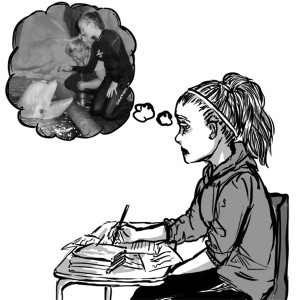
Realizing about a month ago that I filled out my final high school programming sheet came as a bit of a shock. Of course I got the same spiel I’ve received before, “Keep up with those rigorous academics, but don’t forget to schedule in some time for some fun electives.” But the tidbit that had me the most intrigued was, “Wow, looks like you only need your last English credit and half year of Economics.” If this were the case, then why did I actually need to plan for a full senior year of classes?
The answer is simple: colleges love to see students remain focused and challenge themselves all through to the end of their high school experience. This can become challenging, however, especially if the remaining roster for a student becomes full of classes like pottery and team sports. I’m not saying that students should take those kinds of electives, but if they know what they want to pursue after high school, it would be nice to start testing the waters – outside of school.
 The only current options to learn off campus are On-the-Job Training (OJT) or Dual Enrollment classes. For a student to partake in OJT, they must be enrolled in a vocational class, e.g., Culinary, Health Science, Administrative Office Tech and the like, and then leave school 8th period to attend the job. Dual Enrollment is similar to an Advanced Placement (AP) class, except the student attends school at Hillsborough Community College (HCC) for their specific class either before or after their classes here on campus.
The only current options to learn off campus are On-the-Job Training (OJT) or Dual Enrollment classes. For a student to partake in OJT, they must be enrolled in a vocational class, e.g., Culinary, Health Science, Administrative Office Tech and the like, and then leave school 8th period to attend the job. Dual Enrollment is similar to an Advanced Placement (AP) class, except the student attends school at Hillsborough Community College (HCC) for their specific class either before or after their classes here on campus.
My suggestion is what if there was a way for students to just come to school for the needed credits and then leave?Not to slack off, but instead to better themselves by learning with something resembling an internship. For example, in my case, Marine Biology is definitely the route. I would love to attend school for just the couple hours I need, and then head over to somewhere like Mote Marine Aquarium to further my education with some hands-on experience.
Guidance Department Head Susanne Powell says the problem arises with the fact that “high school students don’t usually have the experience needed to support that kind of activity.” But the way I see it, everyone has to start somewhere. And from what I’ve seen, adults usually enjoy working with students better if the student is actually interested in the task at hand.
Powell said she and the other guidance counselors usually tell students to explore different career opportunities through community service and other small jobs. This is mainly because she is not sure if there are establishments out there who offer short term intern- ships. However, if
a student were to get an opportunity like that, she said the experience would definitely be very valuable.
“I think most students look at it as a neat opportunity to not be on campus, but I think a lot of other students benefit from having the one on one instruction,” said Assistant Principal Mark Watson. Watson said that online classes can also be another option besides coming to school on campus. Online courses are usually more difficult in terms of the work load,” said Watson, “[Especially] if the student is not the type of learner who is capable of sitting down at a computer and self-motivating themselves.”
Since most counties don’t allow seniors to only come to school for the few classes they need in order to graduate, the next best thing for the student to do is fill their schedule with classes tailored to what they want to study. With that being said, I look forward to my three sciences classes senior year,including Marine Science.
Emily Goldbach / Opinion Editor
